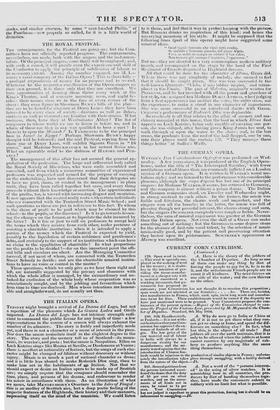THE ROYAL FESTIVAL.
THE arrangements for the Festival are going on ; but the Corn. Inittees have not officially reported progress. The engagements, nevertheless, are made, both with the singers and the instrumen- talists. Of the principal singers, some thirty will be employed ; and, with such a crowd, it will puzzle even the expelience and skill of the Conductor to aptly the principle of subdivisiou of labour to its necessary extent: Among the number engaged, are M. Lv- poisras vocal company at the Italian Opera ! This is sheer folly— a prodigal expenditure of money for no culposo and to no end. Whatever be the respective excellencies of the Opera-singers on their own ground, it is there only that they are excellent. We have opportunities of hearing them thrice every Iveck at the King's Theatre, teal at concerts morning, noon, and night be- sides : their names stare us in the face at every, corner of the street : they even figure in Showman BUNN'S bills of the clay— they are to be heard for sixpence at Drury Lane : they have been listened to by every class of society—dustmen as well as dukes, vint ni-rs as well as vi,counts are familiar with their strains. What business, then, have they at Westminster Abbey ? The list of composers to whose works we are to listen is before us, and in which of these are they in any way qualified to bear a part ? Is Runixt to open the Messiah ? Is TAM13URINI to be the principal bass in Israel in Egypt ? Perhaps Showman BUNN'S happy thought will be followed ; and the real Festival, copying from the sham one at Drury Lane, will exhibit Signora Gals' in " Di placer," and Madame STOCKHAUSEN in her newest Swiss airs. What an agreeable relief to the dulness of HaNnet, and Putt- CELL The management of this affair has not secured the general ap- probation of the profession. The large and influential body called the Royal Society of Musicians, who were early assembled and consulted, and from which a numerous committee of experienced professors was requested and named for the purpose of carrying on the undertaking, have now discovered that their delegates are to have no part, share, or control in its management : in plaiu truth, they have been called together but once, and every thing proceeds without their knowledge or sanction. The apportionment of the profits, too, is viewed with increasing disgust and suspicion. It now appears that the control really rests with certain individuals who are connected with the Tenterden Street Music School ; and such questions as these are put in reference to this fact. To whom is the share of profit to be paid which may be claimed by this school—to the pupils, or the directors? Is it to go towards lessen- ing tl:c charges on the former, or to liquidate the debt incurred by the latter? Is it fair or just to call on professors to accept half the terms which they receive from each other, under pretence of assisting a charitable institution; when it is intended to apply a portion of the money which the Festival is expected to yield, possibly to the liquidation of certain noblemen and gentlemen's debts, and certainly to the support of an institution which can have no claim to the appellation of charitable? In what proportions are the profits to be divided ?—for on this important point the offi- cial bills and circulars are silent. Are the Managing Committee (several, if not most of whom, are connected with the Tenterden Street School) to decide; and are the charitable musical institu- tions to have no voice or control in the matter ?
These questions, which we only give as we hear them right and left, are naturally suggested by the privacy and closeness with which the whole affair is managed, by the extraordinary and un- looked-for exclusion of the whole body whose cooperation was so ostentatiously sought, and by the jobbing and favouritism which from time to time are disclosed. Men whose intentions are honour- able and straightforward, do not usually act thus.




















 Previous page
Previous page